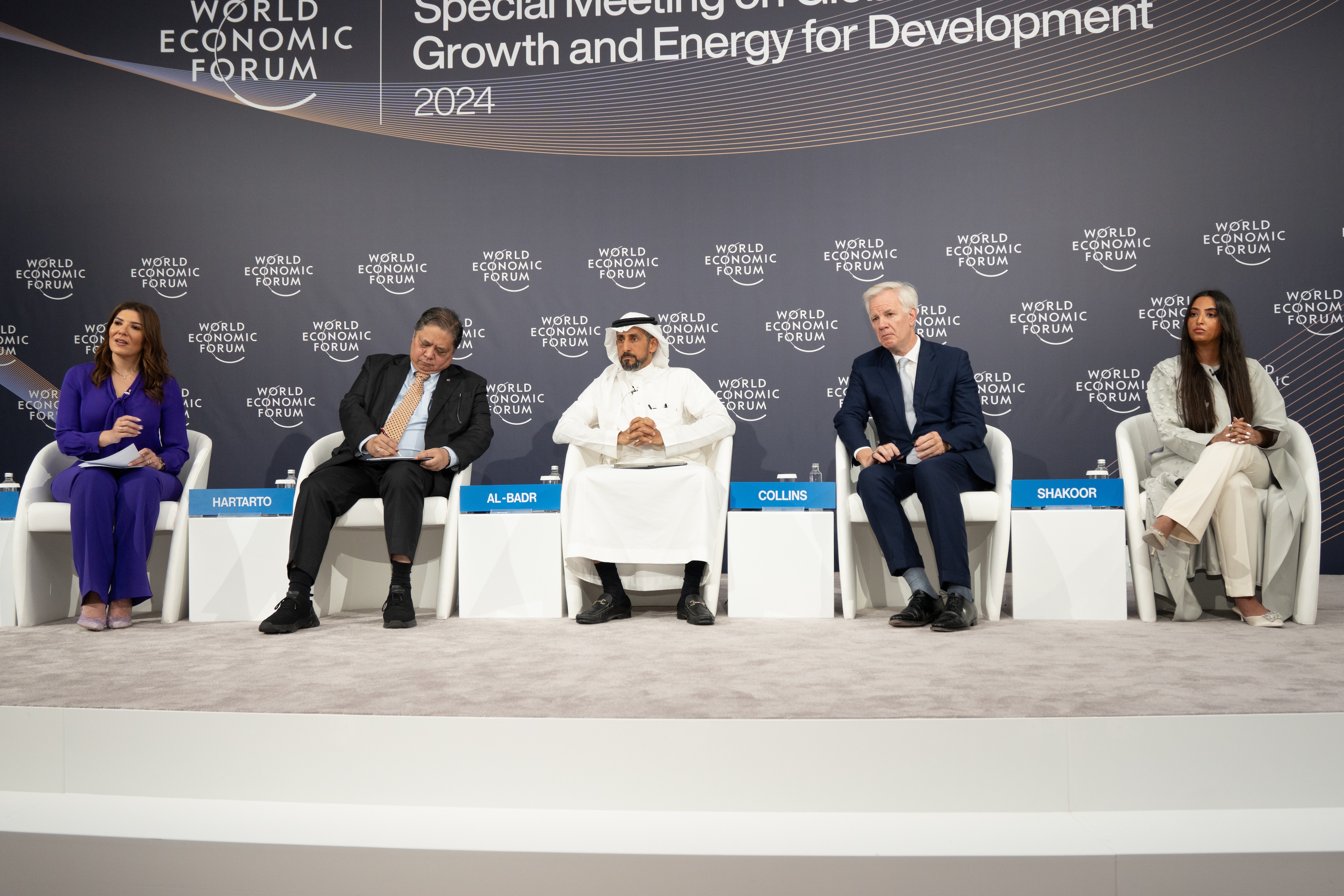Q&A with Jacob van der Blij: How chief risk officers do more than just risk avoidance

In the coming decade, the primary concerns revolve around environmental risks. Image: UNICEF/UN0814415/Karacan

Get involved with our crowdsourced digital platform to deliver impact at scale
Stay up to date:
Jobs and Skills
Listen to the article
- Jacob van der Blij, Chief Risk Officer at UNICEF, sees his role as key to enabling everyone in the organization to manage risk, understanding and anticipating things before they go wrong.
- UNICEF’s role is all about managing risks for children, but there are a number of organizational risks it faces too.
- Risk is not always a negative thing – when it is properly understood it can be mitigated where appropriate and clearly communicated beforehand.
“Without risk, there's no opportunity,” says Jacob van der Blij, Chief Risk Officer (CRO) at UNICEF. “My role is not to take over that responsibility and manage risk for other people, but rather enable everybody in the organization to manage risk as well.”
If there was one event that really brought home the importance of risk management it was the pandemic. It very quickly demonstrated how many functions of business and society are interdependent - and supply chains can easily be disrupted by events on the other side of the world.
The CRO role is about understanding and communicating risks, with a view to helping organizations become more forward-looking and resilient. So it’s not just about managing adverse outcomes, but also identifying positive opportunities.
Financial institutions and the insurance industry, for example, have employed CROs for some years, but over the past decade, it has been growing in prominence in other sectors too. Much of this has been driven by the increasing uncertainties in the world today, exacerbated by the polycrisis.
Indeed, the World Economic Forum’s Global Risks Report highlights how the next decade will be characterized by environmental and societal crises, driven by underlying geopolitical and economic trends. In assessing these global risks, UNICEF's 2023 Global Outlook examines the specific prospects for children in this polycrisis.
To understand the role in more detail, we spoke to van der Blij, who became UNICEF’s CRO at the end of 2022. The job requires him to sit on UNICEF’s global management team, working with a team of risk managers across the organization’s country and regional offices. He previously worked as Head of Risk for Gavi, the vaccine alliance, helping instil a culture of responsible risk-taking to help the organization achieve its aims.
Below is an edited transcript of that conversation.
Firstly, what is risk?
“A risk is basically uncertainty. So something that may happen in the future.
Many people might say, it’s what keeps you up at night. And, yes, those are risks too. But it's not only negative.
You always assess a risk. Is it likely to happen? What would be the impact? We try to prevent it if we can, but it's not always possible. We can also mitigate the impact. We say it may happen, but we are ready for it and will respond to it.
We're not just there to always mitigate the risks. We can also accept risks, but we need to communicate about them and accept them consciously. And so the CRO post is a lot about managing expectations. It’s about making sure that people understand before something goes wrong, what could go wrong so that you avoid the blame game.”
How did you end up being the chief risk officer at UNICEF?
“I don't know many risk managers who have always wanted to be a risk manager. There is no one clear career track or even school for risk management, so you see many people coming from different areas.
There are people who come to it through audit and accountancy and oversight backgrounds. There are people who come from financial risk management or other specialized insurance, for example. So they're very specialized, often in more technical areas.
Increasingly, there is an idea you need to have somebody who brings all these specialized areas together and lifts it up to the strategic level. So I studied artificial intelligence (AI), then went into consulting, into audit and risk management, and over time, I grew into this position, which I enjoy because it's very multidisciplinary.”
What kind of risks does UNICEF face specifically, and how do you manage them?
“Many, many risks. Every activity, every area, every business objective has a risk related to it. And, obviously, our whole mission is about risks to children. So that's where it starts.
We are saying to the world, mitigating many of the risks of the future starts with investing in children now. And so we are there to ensure the children have a good life; they're equally treated. And that often involves doing a risk assessment of where they are at with vaccinations, disease risks, nutrition, education, etc, all of that is part of our core business.
And then, of course, we have all the other types of risk associated with the organization. We run programmes, so we need to manage the performance and the risk related to that. There are business continuity risks, financial risks, risks to our people, how we run our organization, etc.”
What impact do you hope to have on UNICEF as an organization?
“I want to make risk real. In many cases, in many organizations, risk management is seen as something administrative after the fact. It is then policed as a compliance exercise because maybe the regulators – or in our case, donors – asked for it.
So I want to make sure it's a real strategic management tool that helps people understand and anticipate things before they go wrong.
For me, risk management is not at all about risk avoidance. If you do good risk management, you're able to take risks. And at UNICEF that's our mission. We need to take risks. We are sometimes one of the few there in the country to help and to run to the fire where we cannot rely on other actors there.
But we shouldn't be naive. We should go into it with our eyes wide open and understand what we're doing, and be confident we can deal with all these risks because we understand them and we're equipped to deal with them.”
How do you measure success in your role or as a risk manager?
“Risk is often an intangible area. It's about the future and so we cannot predict it. And then there is this paradox – we may do very good risk management and therefore the bad things don't happen, and so nobody sees the impact.
Risk management is about systems and processes, but also about culture. And it's very much a social process. So, for me, success is if I bring people together – if they become more risk aware, talk about risk, think ahead and create this social structure in the organization to not be afraid of risk and to raise things early.”
What do you think are some of the most significant trends shaping the future of work?
“There are lots of predictions about, for example, AI disrupting everything. That's still to be seen. We don't know yet what the opportunities are, let alone the risks of it. But that could have a big impact, including on children and the way they learn, play, develop or prepare for the world of work. UNICEF has developed global guidance on how to maximize opportunities and minimize risks.
Of course, globalization – or deglobalization or decoupling – can change things including supply chains and near-shoring trends. There is also a lot of change geopolitically, economically.
And then on top of that also climate change, which will have a huge impact. This is a slow-moving risk, but it's coming close now. And it will also have a big impact on migration and where jobs are.”
What’s the World Economic Forum doing about climate change?
How can people be more resilient and adaptable given that work is changing exponentially?
“Work is a risk to many people because they are dependent on it. It's also an opportunity. So when people are let go, for example, it feels like a big risk. But often when they look back at the transition, it has been an opportunity to find something else.
A proper risk management approach would be to never be too dependent on one thing. But also just trust yourself and take a risk. I think if you know that you have the right qualities, then you have to trust you can deal with uncertainties in life. Things happen, but we're not afraid of failure. Those are temporary and you bounce back better.”
Don't miss any update on this topic
Create a free account and access your personalized content collection with our latest publications and analyses.
License and Republishing
World Economic Forum articles may be republished in accordance with the Creative Commons Attribution-NonCommercial-NoDerivatives 4.0 International Public License, and in accordance with our Terms of Use.
The views expressed in this article are those of the author alone and not the World Economic Forum.
The Agenda Weekly
A weekly update of the most important issues driving the global agenda
You can unsubscribe at any time using the link in our emails. For more details, review our privacy policy.
More on Jobs and the Future of WorkSee all
Simon Torkington
May 1, 2024
Johnny Wood
May 1, 2024
Giannis Moschos
May 1, 2024
Maria Mexi and Mekhla Jha
April 30, 2024
Stéphanie Bertrand and Audrey Brauchli
April 29, 2024
Elselot Hasselaar
April 29, 2024







